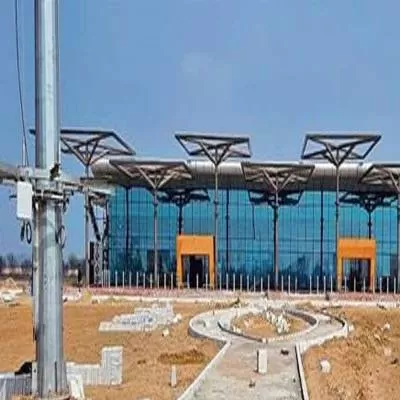- Home
- Real Estate
- Real Estate Bill Approved

Real Estate Bill Approved
Several amendments to the Real Estate (Regulation and Development) Bill, 2015, suggested by the select committee of Rajya Sabha, have now been accepted by the Union Cabinet.
A welcome move
For most, the Bill is a welcome move. Here are a few quick bytes from the industry bigwigs on the approved Bill:
Surendra Hiranandani, Founder & Managing Director, House of Hiranandani: The bill will bring in a systematic approach and enhance transparency, thereby giving a boost to domestic and foreign investments, which will aid growth of the sector.
Sanjay Dutt, Managing Director, Cushman & Wakefield: The Bill will ensure that only the well-capitalised developers remain operative in the sector.
Shishir Baijal, Chairman & Managing Director, Knight Frank India: The amendments should be implemented within the timeframe and we should not lose the momentum now.
Navin Raheja, Chairman, Naredco Advisory Council and Real Estate Committee, FICCI, and Managing Director, Raheja Developers: The Bill is expected to instill confidence among both domestic and international investors. The important expectation from States is setting up of single window clearance mechanism to facilitate time bound clearance of projects.
Ramesh Nair, COO-Business & International Director, JLL India: The Bill will tremendously help the end-users, the consolidation of the industry and regulate the broker community.
Pankaj Kapoor, Founder and Managing Director, Liases Foras: It will bring accountability and efficiency. The disclosure will make things transparent. The government has indicated that it will streamline the approvals´ process and finally move towards a ´single-window clearance´ system.
The missing link
However, the Bill also has a few drawbacks.
Hiranandani says, ´Lack of clarity on the various mechanisms proposed will add to costs through delay, making affordability a distant dream. The implementation of the Bill should be accompanied by regulatory reforms.´ Manoj Gaur, President, CREDAI NCR, adds, ´A sanctioning authority has not been made part of this bill, which leads to delays in projects.´ On his part, Dutt says, ´The Central Government has to ensure that apart from making the developer community regulated, state government and various state run approval bodies are also aligned and made more accountable.´ Overall, the passing of the bill will have a long term impact on creating a better environment for investment in the country. Hopefully, this will provide an impetus to India´s rating as a global investment destination and improve the Indian real estate sector.
Salient Features of the Bill
- Insurance of land title to avoid risk of losing investment.
- Grading of projects and promoters to help buyers take the right decision.
- States to comply with norms and have to make rules within six months of notification of the Act.
- States to establish Real Estate Regulator and Appellate Tribunal.
- Consumer has the option to approach consumer forums at district levels; regulatory authorities to dispose complaints within 60 days. Similarly, Appellate Tribunals need to adjudicate cases within 60 days.
- Penalty or imprisonment up to three years or both in case of builders, one year for both real estate agents and buyers for violating orders of Appellate Tribunal.
- Commercial projects brought under the ambit of the Bill.
- Streamlining the approvals´ process and moving towards a ´single-window clearance´ system.
Major Amendments Approved by the Union Cabinet
- The money collected from buyers is to be deposited within 15 days. It is to be maintained in an escrow account, which will be 70 per cent of the construction cost, and is meant to be used only for the specific project.
- The term of imprisonment of three years recommended by the government has been upheld for all contraventions and even in cases where the developer does not abide by the decision of the Appellate Tribunal, imprisonment has been recommended.
- The Bill will be applicable on commercial or residential properties, which are more than 500 sq m in size or have eight flats or more.
- Carpet area has now been defined as the net usable area.
- All financial statements have to be audited within six months of the financial year closure by a practising chartered accountant.
- The interest payable by defaulting parties (developer or buyer) has been brought at par for both in case of default by either.
CW presents industry views on the recently approved Real Estate Bill 2015. Several amendments to the Real Estate (Regulation and Development) Bill, 2015, suggested by the select committee of Rajya Sabha, have now been accepted by the Union Cabinet. A welcome move For most, the Bill is a welcome move. Here are a few quick bytes from the industry bigwigs on the approved Bill: Surendra Hiranandani, Founder & Managing Director, House of Hiranandani: The bill will bring in a systematic approach and enhance transparency, thereby giving a boost to domestic and foreign investments, which will aid growth of the sector. Sanjay Dutt, Managing Director, Cushman & Wakefield: The Bill will ensure that only the well-capitalised developers remain operative in the sector. Shishir Baijal, Chairman & Managing Director, Knight Frank India: The amendments should be implemented within the timeframe and we should not lose the momentum now. Navin Raheja, Chairman, Naredco Advisory Council and Real Estate Committee, FICCI, and Managing Director, Raheja Developers: The Bill is expected to instill confidence among both domestic and international investors. The important expectation from States is setting up of single window clearance mechanism to facilitate time bound clearance of projects. Ramesh Nair, COO-Business & International Director, JLL India: The Bill will tremendously help the end-users, the consolidation of the industry and regulate the broker community. Pankaj Kapoor, Founder and Managing Director, Liases Foras: It will bring accountability and efficiency. The disclosure will make things transparent. The government has indicated that it will streamline the approvals´ process and finally move towards a ´single-window clearance´ system. The missing link However, the Bill also has a few drawbacks. Hiranandani says, ´Lack of clarity on the various mechanisms proposed will add to costs through delay, making affordability a distant dream. The implementation of the Bill should be accompanied by regulatory reforms.´ Manoj Gaur, President, CREDAI NCR, adds, ´A sanctioning authority has not been made part of this bill, which leads to delays in projects.´ On his part, Dutt says, ´The Central Government has to ensure that apart from making the developer community regulated, state government and various state run approval bodies are also aligned and made more accountable.´ Overall, the passing of the bill will have a long term impact on creating a better environment for investment in the country. Hopefully, this will provide an impetus to India´s rating as a global investment destination and improve the Indian real estate sector. Salient Features of the Bill Insurance of land title to avoid risk of losing investment. Grading of projects and promoters to help buyers take the right decision. States to comply with norms and have to make rules within six months of notification of the Act. States to establish Real Estate Regulator and Appellate Tribunal. Consumer has the option to approach consumer forums at district levels; regulatory authorities to dispose complaints within 60 days. Similarly, Appellate Tribunals need to adjudicate cases within 60 days. Penalty or imprisonment up to three years or both in case of builders, one year for both real estate agents and buyers for violating orders of Appellate Tribunal. Commercial projects brought under the ambit of the Bill. Streamlining the approvals´ process and moving towards a ´single-window clearance´ system. Major Amendments Approved by the Union Cabinet The money collected from buyers is to be deposited within 15 days. It is to be maintained in an escrow account, which will be 70 per cent of the construction cost, and is meant to be used only for the specific project. The term of imprisonment of three years recommended by the government has been upheld for all contraventions and even in cases where the developer does not abide by the decision of the Appellate Tribunal, imprisonment has been recommended. The Bill will be applicable on commercial or residential properties, which are more than 500 sq m in size or have eight flats or more. Carpet area has now been defined as the net usable area. All financial statements have to be audited within six months of the financial year closure by a practising chartered accountant. The interest payable by defaulting parties (developer or buyer) has been brought at par for both in case of default by either.























